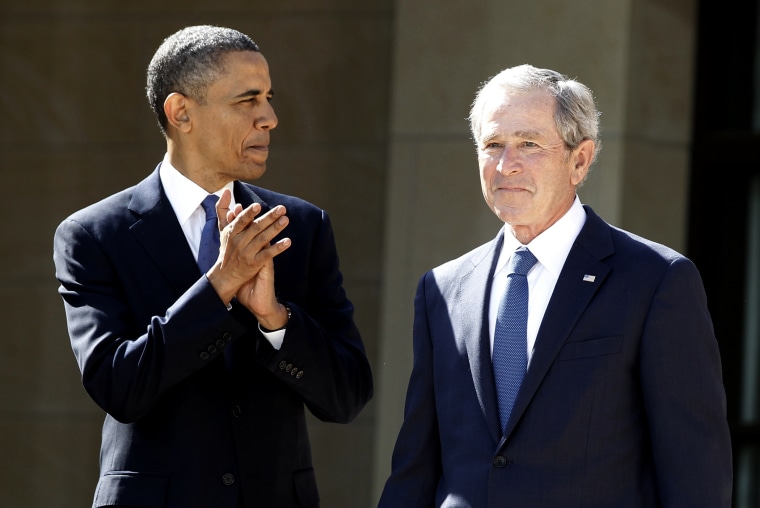At this point in the 2008 presidential race, a relatively crowded field of national Republican candidates was confronted with an unyielding reality: their party's two-term president was deeply unpopular. According to Gallup, as of mid-October 2007, then-President George W. Bush's approval rating was a woeful 32% -- about 14 points lower than President Obama's standing now.
And so, GOP candidates were pretty cautious about their associations with the flailing Bush/Cheney administration. The very last thing Republican presidential hopefuls wanted was to be perceived as offering Bush's "third term."
Fast forward eight years. Another two-term president is nearing the end of his tenure, but note what happened in last night's debate when Anderson Cooper offered Hillary Clinton a chance to distance herself from President Obama. From the
transcript:
COOPER: Secretary Clinton, how would you not be a third term of President Obama? CLINTON: Well, I think that’s pretty obvious. I think being the first woman president would be quite a change from the presidents we’ve had up until this point, including President Obama. COOPER: Is there a policy difference? CLINTON: Well, there’s a lot that I would like to do to build on the successes of President Obama, but also, as I’m laying out, to go beyond.
The response didn't cause much of a stir, but it was a pretty extraordinary answer given the political world's general assumptions about Obama, his standing, and the public's appetite for an entirely different policy agenda.
Given a chance to distance herself from the president -- Clinton's former rival -- the Democratic frontrunner made no effort whatsoever to play along.
The president’s name was invoked 21 times -- and largely by Hillary Clinton. She referred to him 13 times, usually in a positive manner, talking about the things "President Obama and I" did. When Lincoln Chafee questioned her judgment because she voted for the Iraq War, she said, "I recall very well being on a debate stage, I think, about 25 times with then-Senator Obama, debating this very issue. After the election, he asked me to become secretary of state." [...] Meanwhile, Bernie Sanders and Jim Webb referred to Obama twice, Martin O’Malley referred to him three times, and Chafee did once. Words like "admiration," "affection," and "support" were thrown around, but Clinton drove home the point that she worked, arm in arm, with the sitting president, who is very popular among Democrats.
That last point is of particular interest. I think the general media narrative is that President Obama is unpopular. I also think that narrative is wrong -- Obama is arguably the nation's most well-liked politician, and among Democrats, his support is generally between 80% and 90%.
Republicans wanted nothing to do with Bush towards the end of his presidency, but we're looking at a very different dynamic, at least for now, with Democrats in the 2016 race.
It'll be especially interesting to see how this plays out next year as Election Day approaches. If Hillary Clinton is the nominee, think about the national surrogates who'll be able to hit the trail on her behalf: Bill Clinton, Barack Obama, Joe Biden, in addition to Clinton and her running mate.
The GOP nominee will have ... who? George W. Bush probably won't be headlining many rallies. So the nominee might turn to John McCain? Mitt Romney? Other national figures who lost major races?
